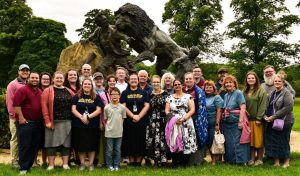In June, travelers from all over the U.S. embarked on a journey. Some knew from past experiences, but others did not; this journey would be physical and spiritual.
• Scotland in need of the Gospel.
• Missionaries in need of help and encouragement.
• Travelers in need of an eye-opening cultural and spiritual experience.
These things brought us to Scotland this summer, a land of atheism and agnosticism. See The Harvest took two teams: Team Livingstone and Team Carey. Each team named after a great missionary the United Kingdom produced in centuries past.
The goal of Team Livingstone: get a copy of John & Romans through the letterbox (mail slot) of every home in the city of Dumfries, Scotland. Only by God’s grace and strength on our team we accomplished this goal. The goal of Team Carey: invite people to, and hold a week-long revival meeting at Solway Baptist Church, followed by a three-day kids Bible club. Though not without our adversary, Satan, trying to deter us, we accomplished this goal.
Our travelers on Team Livingstone came with determination, knowing they were the ones to hit the streets hard. Without complaint, many of them, if not all, ended up walking around 6-7 miles per day. No easy task, but our people were motivated by the Gospel and saw each door as a family that needs Christ. God can use people with a perspective like that in ways outside of our own strength. We sowed seed, knowing that was our job and our goal.
Team Carey came ready and willing to serve in any capacity needed, whether it was singing, song-leading, preaching, or teaching. Since the services were in the evening, our people participated in a variety of ministries during the day: letterboxing, stuffing literature, and street evangelism. By our group’s testimony, God used this to grow and challenge many team members. The “comfort zone” is where Godly fear goes to die. Our people spent most of their time outside their comfort zones, allowing God to influence them in unexpected ways. Along with daily ministry, travelers learned what it is like for over 15,000 John & Romans, 15,000 salvation tracts, and over 7,000 event invitations to be given out and receive little to no response. During our revival week, we had zero visitors from the community. During our Kids Bible Club, we had zero visitors from the community. This is not because of a failure on our part.
See The Harvest Scotland 2024 accomplished what we set out to do, and we left the rest up to God. We showed up for him, and we believe the work put in by our people was not in vain, but rather, exactly what Scotland needed. We put a physical copy of God’s word in every home in Dumfries, giving them a choice to make. I do not know anyone who trashes their mail without first inspecting it. Somebody in each home held a copy of Scripture and a road map to salvation. It could be the only one they ever receive. The United Kingdom was once the epicenter of Christianity, but no longer. We did our part in helping those bringing the light of the Gospel to such a dark nation.
• Over 15,000 copies of Scripture were given out.
• Our host family was encouraged by the fellowship and work that was put in by the team.
• Our travelers left burdened for the people of Scotland and world evangelism.
See The Harvest Scotland, 2024 was a success.



